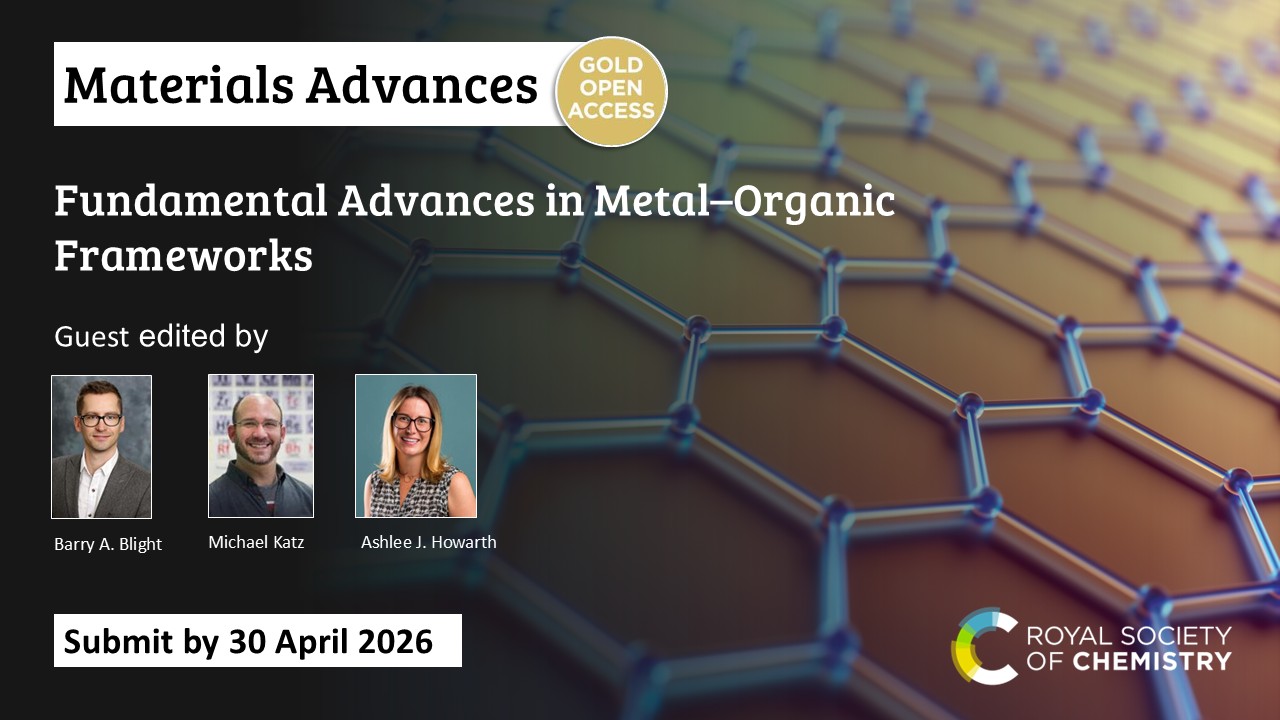We are delighted to welcome Professor Wee-Jun Ong (Xiamen University Malaysia) to the Advisory Board of Journal of Materials Chemistry A.
Wee-Jun Ong received his B.Eng. and Ph.D. in chemical engineering from Monash University. He is a Professor and Assistant Dean in the School of Energy and Chemical Engineering at Xiamen University Malaysia. Starting from 2021, he has served as the Director of the Center of Excellence for NaNo Energy & Catalysis Technology (CONNECT). Since September 2024, he has been an Adjunct Professor of the College of Engineering at Korea University. Previously, he was a scientist at the Agency for Science, Technology and Research (A*STAR), Singapore. In 2019, he was a visiting scientist at Technische Universität Dresden and a visiting professor at Lawrence Berkeley National Laboratory. His research interests include nanomaterials for photo(electro)catalytic and electrochemical H2O/seawater splitting, CO2 reduction, H2O2 production, plastic upcycling, nitrate reduction, urea synthesis, alcohol oxidation, and biomass valorization as well as microwave plasma methane cracking to produce graphene and hydrogen. He currently serves as an Associate Editor of SmartMat and has been appointed to the Advisory Boards of several leading journals such as Materials Horizons, Journal of Materials Chemistry A, Small, Nano Research and Chinese Journal of Catalysis. For more details, refer to https://sece.xmu.edu.my/faculty/academic-staff/ong-wee-jun
- What does it mean to you to join the Advisory Board of the Journal of Materials Chemistry A?
It is a meaningful professional recognition to be invited to serve on the Advisory Board of Journal of Materials Chemistry A, one of the flagship journals of the Royal Society of Chemistry in the field of energy and sustainability materials. This appointment reflects the trust of the editorial leadership and the broader international materials community in my research contributions, scholarly judgment, and long-term engagement with energy-related materials science.
Beyond recognition, this role carries a clear responsibility. Journal of Materials Chemistry A plays a defining role in setting scientific standards and research directions for materials addressing global challenges in energy conversion, storage, and sustainability. Serving on the Advisory Board provides an opportunity to contribute beyond individual publications where it helps to shape the journal’s scientific vision, uphold rigorous and ethical peer-review practices, and identify emerging research themes with long-term and real-world impact.
Importantly, this appointment allows me to give back to the global materials community by supporting the dissemination of high-quality, reproducible, and impactful research, particularly in clean energy, catalysis, and sustainable materials, where rapid yet responsible scientific advancement is essential for delivering tangible societal benefits.
- What is the biggest challenge you currently face in your field?
One of the most pressing challenges in the field of catalysis and energy materials research is achieving clear mechanistic understanding at the atomic and electronic levels. Establishing robust and transferable structure–activity relationships requires seamless integration of advanced experimental techniques with theoretical modeling and simulation. While substantial progress has been made, bridging this gap in a truly predictive and universally applicable manner remains difficult.
Another major challenge lies in the effective deployment of machine learning and AI-driven approaches. Although data-assisted catalyst discovery is advancing rapidly, limitations related to data quality, model interpretability, and physical relevance still constrain widespread and reliable adoption. Ensuring that data-driven insights remain grounded in fundamental chemistry and physics is critical.
Finally, commercialization and real-world viability remain key hurdles. Translating laboratory-scale breakthroughs into scalable, stable, and economically competitive technologies, particularly for hydrogen production, CO2 conversion, and waste valorization, requires close alignment between fundamental science, engineering design, life-cycle considerations, and sustained industry engagement.
- What advances in your field are you most excited about?
I am particularly excited by recent advances in in-situ and operando characterization techniques, complemented by ex-situ analyses. These tools now allow us to directly observe dynamic structural, electronic, and chemical changes during photocatalytic and electrocatalytic reactions, fundamentally reshaping our understanding of active sites, reaction intermediates, and charge-transfer processes.
Equally promising is the rapid maturation of computer-aided and data-assisted catalyst design, where theory, high-throughput computation, and machine learning increasingly guide experimental discovery rather than merely rationalizing results post-facto. This shift marks an important step toward predictive materials design.
I am also encouraged by the growing momentum behind waste-to-wealth and circular economy initiatives, where catalysis enables the conversion of CO2, biomass, plastics, and wastewater into value-added fuels and chemicals. Ultimately, deeper insight into fundamental charge dynamics and reaction mechanisms will be the key driver that propels catalysis from empirical optimization toward truly predictive, sustainable, and scalable solutions.
Read Professor Ong’s recent publications in the RSC materials portfolio:
Journal of Materials Chemistry A: Temperature-driven phase engineering: synergistic effect between NiS2 and MoS2 coupled with N-doped graphene self-supported on carbon cloth for efficient electrocatalytic seawater splitting
DOI: https://doi.org/10.1039/D5TA01054C
Materials Horizons: Evolving electrocatalytic nitrate-to-ammonia conversion on Cu- and Co-based catalyst engineering with paired electrolysis approaches























